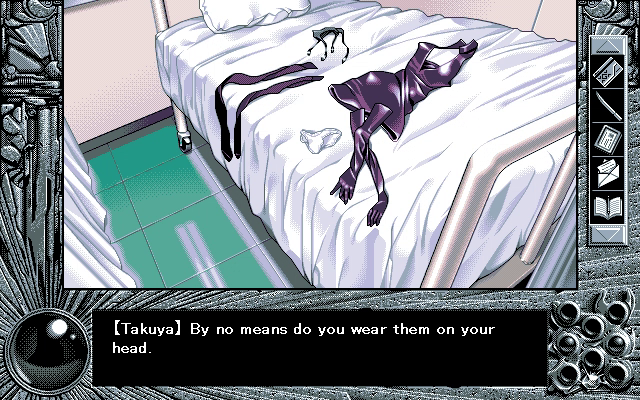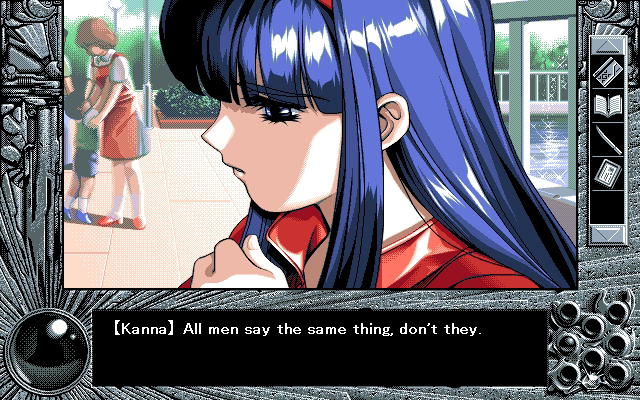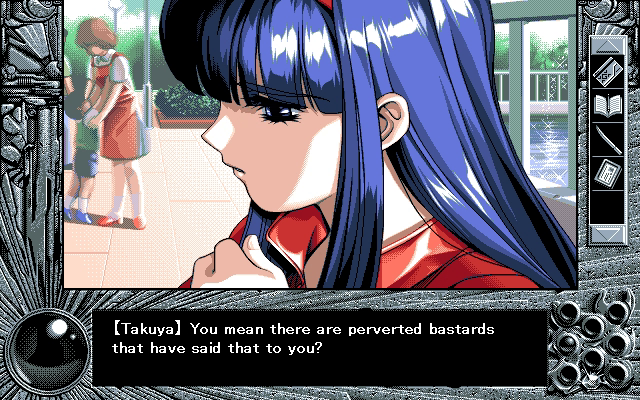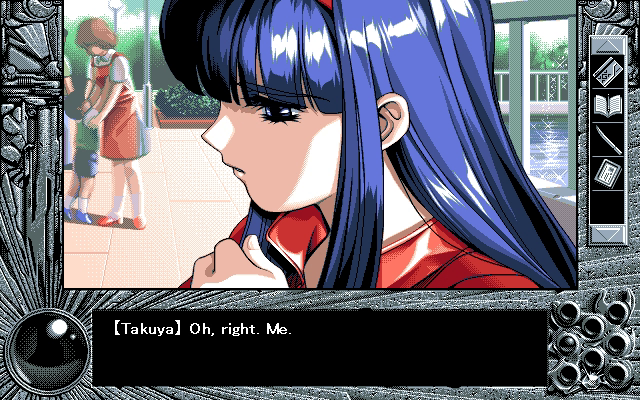Conclusion

In YU-NO is the potential for a superior story. Takuya resents Koudai for his abuse, neglect, and disrespect of women and despises the antagonists Houjou and Toyotomi in large part for their misogyny and, in the latter’s case, Koudai-like arrogance. In his own attitudes and actions, Takuya emulates his father, repeating the behavior that traumatized him. During a daytime visit to Meiunji Park, Kanna even succeeds at making Takuya, who becomes violently angry at her description of johns disrespecting her in exactly the same ways that Takuya disrespects her, recognize that he is part of the problem. But the story never addresses this behavior. Takuya does not even have an arc within the Kanna route itself.



(In fact, the ending of the Kanna route is that Takuya vows to return to her after finding his father but abandons her instead! There is no other way to reach the true ending! Takuya does not even comment on it, there is no drama, and nobody ever mentions it again. Imagine the possible scene: Takuya has to warp back using a jewel save just to leave her for good, but he explains and they at least have a tearful reunion or a big fight. But the disk space was better allocated to more boobs.)
When Takuya starts his own family, a different writer might allow him an opportunity to not repeat Koudai’s mistakes. In a different story, Koudai, instead of a godlike font of wisdom, might have turned out to be the God Emperor, expanding the family drama (and unsettling Freudian subtext) to the political conflict of the isekai world. The collapse of the Dela Grante slave camp Gazel Towers could retain the Freudian symbolism: the deflation of the God Emperor’s phallus. As Koudai abused Takuya, now as a paternalistic figure he uses the state apparatus to abuse a whole country, including Takuya’s wife and daughter, employing the justifications from his own mouth instead through Ayumi, his former student he preyed upon when he was a professor who, in the actual YU-NO, perfectly docile, delivers the forty-minute exposition dump reciting what she learned from her husband’s notes. Rather than accept the God Emperor’s arguments downplaying the brutality of the theocratic dictatorship, Takuya could reject his own negative attitudes and overcome his trauma to defeat his father both literally and metaphorically by becoming a better man. Instead, Takuya fucks his daughter.
(Yes, the ending could be taken as Takuya growing by not abandoning his child like his father chose to abandon him, but only if you ignore, well, the entire rest of the story.)
Anyone who claims the script condemns or analyzes Takuya’s behavior, that Takuya is a complex figure who may show how people contain both good and bad, is drawing on their fantasy of what YU-NO is instead of drawing on YU-NO. Takuya gets away with everything; he never changes his behavior, except deciding not to resist sex with Yu-no because he learns that fucking your children is cool; only other characters ever pay for his mistakes, sometimes with their lives; every girl loves him and sometimes compliments his alleged good character despite his weird and unsettling behavior; and lusting after his own mother, stepmother, and biological daughter saves the universe, because it is what ultimately drives him to impregnate his mommy-lookalike Sayless with Yu-no, and then Yu-no explains that getting plowed by her dad is what gives her the strength to complete the rite of the priestess.
